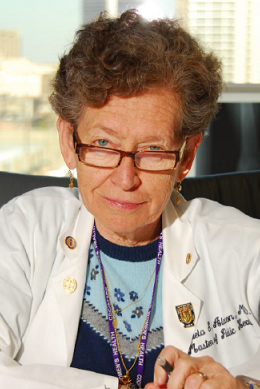Guest Speaker Bio - Dr. Graciela Alarcón

Dr. Graciela S. Alarcón's interests are focused on prevention and outcomes research dedicated to the study of risk factors accounting for poor disease outcomes among patients with different rheumatic disorders, to the modification of these risk factors and to the implementation of evidence-based advances in clinical practice.
She is focusing on lupus and is the PI for the LUMINA and PROFILE studies of SLE. In the LUMINA (LUpus in MInority populations NAture vs nurture) study, a multicenter effort (UAB, University of Texas Health Science Center at Houston, UTH and University of Puerto Rico, UPR) has been undertaken to constitute a multi-ethnic cohort of SLE patients of Hispanic, African-American and Caucasian ethnicity, to determine the factors predictive of outcome. A comprehensive database which includes detailed socioeconomic-demographic, clinic, immunologic, immunogenetic, functional, psychological and behavioral variables has been established and a serum and DNA repository are in place. Process and end-point outcomes being examined include disease activity, damage, thrombotic events, and mortality. This rich longitudinal database is an invaluable resource for determining the many different factors that can affect the outcome of lupus among individuals from different ethnic groups.
Within the UAB P01, Dr. Alarcón has, in conjunction with investigators at other centers, established another multi-ethnic, multicentric cohort of lupus patients. The purpose of this cohort is to determine the genetic factors that may account for a given outcome in this disease, or to what extent the genetic profile of an individual explains the phenotype, hence this cohort has been named PROFILE. As with LUMINA, a DNA repository is being secured and, in order to obtain a replenishable DNA supply for all PROFILE patients, EBV immortalization of cell lines is now performed at the UAB GCRC. As new genetic information, from P01 investigators as well as from other centers, is developed and putative markers recognized, they can be examined in this cohort. The time at which renal involvement occurs in the course of the disease in SLE and is evolution over time is currently being examined in this cohort.
With funds from the Kirkland Scholars Program, Dr. Alarcón has and is training a number of research fellows who have contributed immensely to the productivity of both LUMINA and PROFILE. These trainees are expected to return to their countries of origin to develop their own lupus research projects.

















